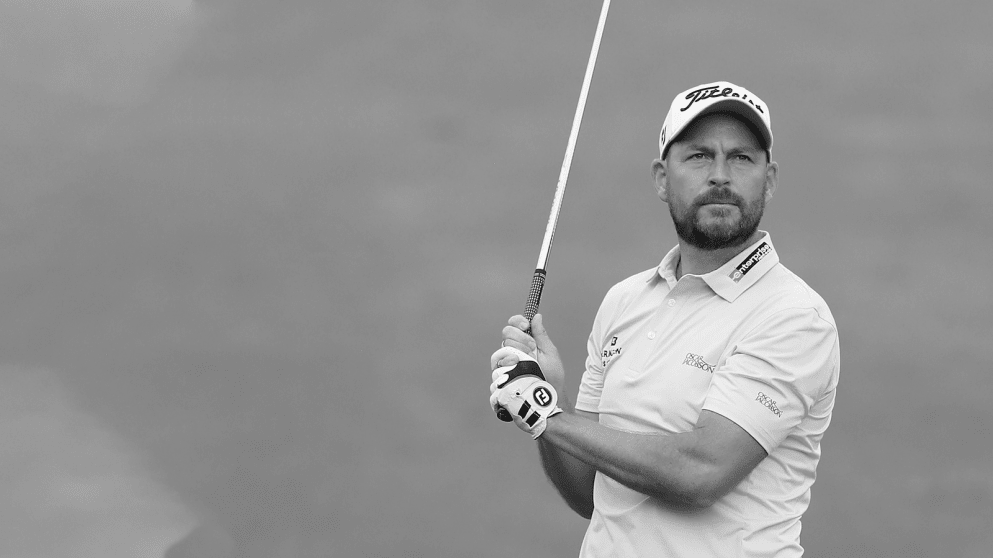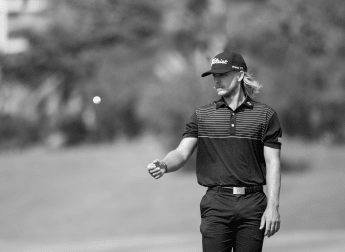In this week’s Player Blog presented by Enterprise Rent-A-Car, former Ryder Cup player and Enterprise Ambassador David Howell gives an insight into his role as Chairman of the European Tour’s Tournament Committee, why the players are taking a firmer stance against slow play and his own undiminished desire to return to form.


Sitting on the Tournament Committee gives you a fascinating insight into the Tour. I like a bit of debate, as my mates at dinner would tell you. They probably think I’m the worst person to be on a committee because I’ll have an argument with myself. I’ve been on for about ten years ago now though and I enjoy it. When I joined I was in Austria and I had been on Tour for about 15 years and I had done pretty well. I had no family at that point and I felt like my game had risen to a high enough level where I would feel welcome in the committee room so I put my name forward and I’ve been on ever since. When Thomas Bjørn became Ryder Cup captain a couple of years ago, he felt it was time to move on from the role of Chairman, so they appointed me. I’d be Vice Chairman for a few years and I had deputised for him as Chair a couple of times when he had been away, so I’d had some experience and I feel honoured to follow in the footsteps of our former Chairmen, such as Neil Coles, Mark James and Thomas. Some big names in golf.
Being Chairman is a privilege, but it’s also a big responsibility. You don’t grow up in the business world, you grow up as a golfer and you are only interested in yourself. Suddenly you are sitting there in a business environment, with our CEO, who is CEO of a big, global company, and other executives, and it is very interesting. You get to see a different angle about why decisions are made and how tricky running the Tour can be at times. I also get to attend the European Tour’s Board meetings. I don’t get to vote, as I’m not a board member, but I’m the link from the Players’ Committee, and it is really interesting to observe those meetings. You really get to see the inner workings of a big corporation and that’s the only chance I will have to sit at board level, so it is fascinating. It gives you a real insight which you might not otherwise get, but it is also a big responsibility too.
I’m having to learn new skills pretty fast. You watch other people chair meetings and you think about how you might do it differently. The last meeting we had in Dubai I thought was much better. I took a bit of stronger line as Chairman, streamlining the meeting agenda, and it seemed to go well. So, I’m learning as I go. But at the heart of it, what do you want from a chairman? You want someone who cares passionately about the Tour, you someone to make sure there is great debate amongst the players, and you want the committee to be a place where people are comfortable airing their views. It also should be somewhat fun, if you can have that in a committee room. Ultimately though, the goal is for them to be engaged. Hopefully I am capable of creating that environment. At times it can be a difficult balance for us trying to please the man who is in 115th in the Race to Dubai and the man who is first. We are all members of the Tour and it should work as well as it can for everyone. That’s always important to remember when you are on the committee.
Player Blog: David Howell reflects on reaching 600 European Tour appearances
Congratulations, @DavidHowell530 on your 600th European Tour appearance 👏🏻 pic.twitter.com/eQ50B6wx85
— The European Tour (@EuropeanTour) August 16, 2018
There have been some big changes on the European Tour over the last few years. We’re in a new era, led by the Tour’s Board and Executive and backed by the Tournament Committee. I think the Tour has taken some very big steps and I think we are on a good trajectory, particularly when you look at some of the great initiatives we’ve implemented, such as our Golfers with Disabilities programme, our closer interaction with the women’s game through mixed events and the work of our social media and content team which is breaking boundaries and winning awards. The Tour is a unique structure from a pure business perspective in that it is a non-profit, members’ organisation and that can often be hard for people to get their head around. We’ve had people leave the committee before because they’ve felt ineffective. I would completely disagree with that. Actually, sometimes the committee has got too much power that it is almost surprising in terms of the golfing side. What happens is people sometimes conflate the golfing side and the business side. They want the committee to have too much of a view on how they business is run. I’m pretty clear that as players we let the executives run the Tour, but on the golfing side we have a lot of power, ultimate power really, as a members’ organisation.
One of the most significant areas the committee had had an impact on is our new pace of play policy. Pace of play has always been an issue in golf. I’ve been on the committee a long time and I remember it being discussed at players’ meetings even before that. It’s an issue at golf clubs. At times it has felt like an unsolvable issue. Everybody wants golf to be played quicker, I think we all agree on that. Nobody wants to go round in five hours, we all want to play in a quicker time. That said, golf can be too quick for some players, and it can feel like a rush. I’ve always been middle of the road in my view, and as chairman my role is simply to frame the conversation. I’m very cognisant that with full field events, 156 players, three balls, it is going to take a minimum of 4hrs 45 minutes. We know that. There is a limit to how quickly it can move with so many players on the course, so you must frame everything through that prism. When we accepted that, it quickly became clear there was a very strong view from the committee that it was very annoying that some players didn’t seem to care about pace of play at all. So the focus changed from round times to individual slow players, those who some people would deem were engaging in gamesmanship, pushing the boundaries of what is acceptable behaviour and trying to gain an advantage to the detriment of other players. We therefore tried to shape our new decisions and regulations to guard against that, allowing referees to time individuals players rather than groups, so quick players in a group don’t necessarily get burdened.
So far, the new policy seems to be having an effect. The feedback I’ve had from players who have played with those players known to be on the slower side, shall we say, is that our new regulations seem to be working. I’ve heard some glowing praise about the speed some players have played over the last few weeks. Everyone seems to be more aware now. Have round times come down? Well, marginally, by around ten minutes, but that’s not really the goal. For me, I’ve been fed up with commentators talking about pace of play, and I’ve worked in TV. For a long time there has been a narrative around slow play in golf. Nobody cares the last round of the Masters takes four hours, or the Ryder Cup rounds take a long time, because they are brilliant. Our new policy allows our refs to target slow players and I think the introduction of the shot penalty for two bad times in a tournament, as opposed to a round, is important. The acid test for the policy is whether the slower players are playing in a reasonable time more often. If the threat of a penalty allows that to happen, then there should be no need for the shot penalty to actually happen, but the threat needs to be there and it needs to be real. In the Middle East swing, I know everybody was on their toes. In Abu Dhabi, my group had a conversation on day one to say: “right, shall we get on with this, boys? Let’s do all we can to keep us in the right place on the golf course.” A little kick up the backside for certain people is sometimes what is needed, and people are starting to realise they can play just as well if you play a little quicker and you play ready golf. Most of the guys seem prepared to do that and that’s the way it should be. I’m proud the European Tour has been leading away, but there is also closer collaboration now across all the Tours to ensure we all have similar regulations and hopefully that will lead to this narrative around slow play disappearing, almost to the point where refs won’t need to be timing because people are just going round doing what they should be doing. That’s the idea, to remove the narrative and get away from it being a discussion point.
It is, on the european tour we have just strengthened our position on exactly this sort of slow play, round times r hard to bring down but individuals that play this slowly are about to be clamped down on with the strongest penalties and harshest time limits in our tours history
— David howell (@davidhowell530) August 11, 2019
As a player, the last two years have been absolute hell for me. I didn’t see it coming. I played great in the 2015 season and in 2016 I was injured but kept my card. The last two or three years have been challenging, mostly through injury I like to think, but I also lost my way. I’m playing better at the moment though, there’s no doubt about that. After being on tour for 25 years though it feels like you are trying to turn a big ocean liner round. It takes time and at the moment it’s baby steps. I’m fully aware that if I don’t though turn it round I’m going to end up in an awkward situation as a Tournament Chairman with no Tour card. I’m desperately trying to avoid that situation and I don’t mean by ditching the Chairmanship. I feel like I’m playing better now and I’m healthy so we will see. I’ve had a great career so far, but I’ve lived my full adult life out here on Tour. It’s like being institutionalised and I’ve got no desire to leave the institution. I’m still as keen as ever. Whenever I look at my situation, I’m very aware that my desire, my love of the game and my love of being out here are as strong as ever and have not diminished whatsoever, it is only my form that has. But I fully intend to turn it round. My next victory would certainly be my proudest. That’s the way I look at it. I’ve been through a major blip, but I’m not ready to give up in any way shape or form. Turning my career round from this point, staying out here and becoming competitive again, that in itself would be success after the two years I’ve had. I always assumed because of the way the first 20 years of my career and being on the career money list that I would be out here until I’m 50 and then join the Staysure Tour. That’s still my goal, and I think if I can still do that it will be a big achievement.
When I’m not playing, I really enjoy commentating. I fell into it in my first bad year on Tour in 2007. I was fairly high profile then but not playing well, and Sky opened up to having some new people into the commentary chair. My first event was the World Match Play in America. I really enjoyed it and Sky have been great to have me back every year since. I’ve never had a proper job so what I like about it is feeling like I’m actually going to work two or three weeks a year. It’s quite nice having a boss, having responsibilities and being told what to do, but doing it whilst talking with my friends, about people I know and about a game I love. It’s wonderful. I feel very fortunate to do it. Playing in Open Championships and in Ryder Cups are the best feeling in the world. At heart I am a player, I think we all agree Ryder Cups have passed me by, but I still hope to play in one or two more Opens from here. Being able to talk over a Ryder Cup or Open Championship is also an amazing privilege though. If you said that to me 24 years ago when I was 19 and I had never played on the Tour, I would have snapped your hand off at that opportunity. So it’s great fun.
To find out more about Enterprise Rent-A-Car and the European Tour, visit www.enterprise.co.uk/europeantour or follow Enterprise Rent-A-Car on Twitter, Facebook and Instagram.






